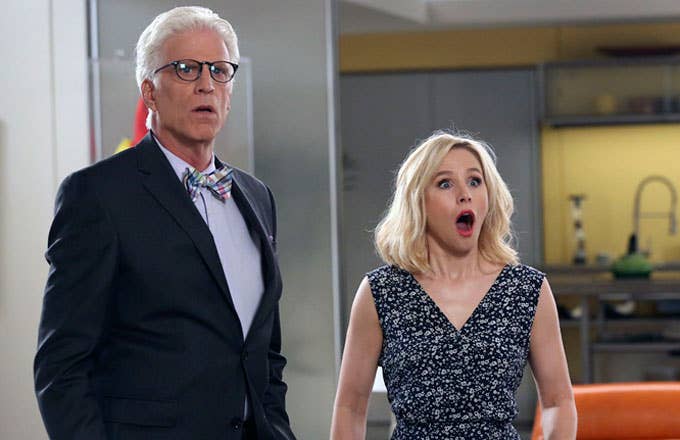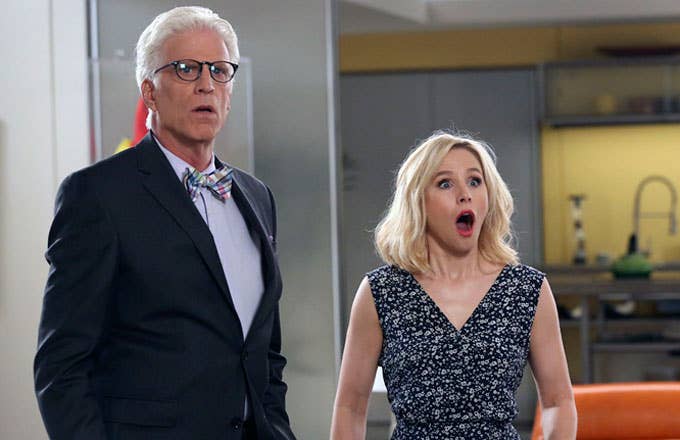
“Holy shit, can you believe what just happened on The Good Place?” I’m talking about last night’s chapter, the third episode of season two. But with this show, that reaction is starting to become evergreen. Of course the biggest of wows associated with NBC’s adolescent sitcom is its now infamous season one finale, where series creator Michael Schur pulled off a Hall of Fame twist that turned the entire premise on its head. It was ingenious. It was satisfyingly fair and sturdy. It was a rare, genuine surprise; in this era reddit threads and avid water-cooler chats deduce that, say, Bernard’s a robot or Elliot’s really in jail weeks before the writers room would like you to. Most importantly: it was exciting.
The Good Place’s first season is a revelation, easily in the top five or 10 of new series that debuted during the 2016-17 TV season. The most watched comedy on television—excuse me, most watched series on television—is on a broadcast network, sure. But in terms of quality? We give black-ish, New Girl and Brooklyn Nine-Nine props, but that’s where it stops. (Fare thee well, Carmichael Show.) The shared company isn’t incidental, Schur is also a co-creator on Nine-Nine. Between that and the now archived classic Parks & Rec, Schur is one more critically-acclaimed hit away from cementing himself as a bonafide sitcom auteur. And Good Place might be the series that does the heavy lifting for his legacy. Truly, nothing else on TV—comedy or otherwise—matches its ambition.
For the uninitiated: Kristen Bell plays Eleanor, a defense-mechanism riddled sociopath who nonetheless wakes up in the afterlife to learn she made it to “The Good Place,” but by an accounting error, slipping through to the highly selective paradise on someone else’s resume. From the show’s intriguing but merely solid pilot, one could assume what the basic structure of the series would be. Eleanor and her confidante Chidi—the intended soulmate for the person whose Good Place slot she stole—would keep her secret from Good Place architect and overseer Michael (Ted Danson) while Chidi, an ethics professor, would help her earn her place there for real. The Lesson of the Week formula basically wrote itself before episode 2’s credits rolled. The cynical, seen-it-all TV viewer could predict how this would play out for seasons to come, with Michael perennially one step behind Eleanor while hijinks ensued because of her foreign presence. But then, after one hijink-and-consequence too many, Eleanor confessed. At the end of episode 7 of a 13-part season.
Season 2 will get all the acclaim for formula subversion, and breakneck plotting but season 1 was already on this wave. Eleanor’s confession opened the floodgates for one unprecedented swerve after another, all the way up until that finale, where the unpredictably shrewd Eleanor realized no true paradise could allow for so much misery: she, Chidi, her self-involved frienemy Tahani, and bumbling idiot/fellow impostor/EDM DJ (lol) Jason, never made it to the Good Place. Michael is actually a higher being architect for the Place down below for “bad people,” and something of a maverick as well. In a grand departure from typical, physical torture, this Hell-Is-Other-People ruse is an experiment in psychological torture. Season 1 ends with Danson letting out a memorably spine-tingling cackle as Michael props Eleanor for being so damn smart, then begs his boss for one more chance and wipes the foursomes memories to do the whole thing over again.
Again, Schur dared us to think we know where he’s going: season 2’s mind wipe will allow for a little character remixing, while Eleanor slowly but very surely outsmarts him again. The two-part premiere does just that...to completion, before unraveling everything AGAIN. The premiere was fantastic and original in its own way, particularly in structure. But last night’s episode, “Dance Dance Resolution”? Well, that was just absurd. A truly insane piece of kitchen-sink writing that listed every possible cause-and-effect of Michael’s game and threw it at the wall in just 22 minutes, with yet another unpredictable twist ending to boot.
Most of us approach sitcoms, even those with the most original premises, expecting—and even wanting—some degree of formula and familiarity. The shows that buck expectation and play with things like structure episode to episode (Master of None’s dating app episode/bottle installments like “New York” or “Thanksgiving”; Insecure’s 30 Days With... finale conceit) are often billed as dramedies, thus freeing themselves of expectation. But Good Place is sitcom through and through, and it’s taking narrative chances even some of your favorite proper dramas wouldn’t risk. And the risks are heavy. As last night proves, these aren’t even the same characters we spent a whole season getting to know. Their core traits are still there, sure, but this is now an ensemble comedy with no clear discernation on how the ensemble even relates to each other anymore. Excessive mind-wipes have now, as one major example, accelerated Eleanor and Chidi from friends with sexual tension to full-on star-crossed lovers, an evolution we have to learn rather than watch as a compromise to Schur’s dynamic plotting.
Across three episodes (plus all of season 1 when recontextualized through the twist) Michael’s entire arc has been a meta commentary on the pitfalls of heavy-handed writing. The Good-Bad Place experiment is his narrative and the more tightly he controls and plots, the quicker things spin out of control; he’s the audience surrogate, just as bewildered by the speed by which Eleanor is reformed enough to confess or the ways she always ends up outsmarting him even with one hand tied behind her back. With the story spiraling away from him and his cast/writers room of fed up Hell minions revolting (or in Vicki’s case, betraying) we end this week’s chapter with Michael beaten, and ready to join Eleanor and co. to defeat Vicki., effectively resetting the status quo again.
Without getting much into what goes on next week, it would seem we’ve ostensibly reached a point where the narrative could settle and glide a bit. But to underestimate Schur is like Michael underestimating Eleanor. There’s no telling where this season will end up by the finale, much less in two weeks; I’ve stopped trying to guess. The ride is too fun—and most important, genuinely laugh-out-loud hilarious—to bother caring. Critics are very much here for The Good Place and its trailblazing approach to sitcom format (blow it up). I pray audiences are too.

